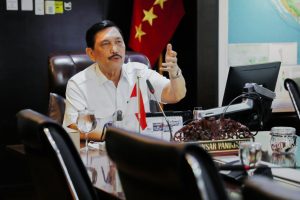On November 17, President Donald Trump met with Indonesian Coordinating Minister for Maritime Affairs and Investment Luhut Pandjaitan. This meeting did not appear on President Trump’s public schedule and the White House has not provided a readout of the meeting. The Indonesian government released its own readout, but this was light on details, leaving much of what was discussed to speculation. Also present were Trump’s daughter Ivanka Trump and her husband Jared Kushner, both advisors to the president, along with Adam Boehler, chief executive officer of the U.S. International Development Finance Corporation (DFC).
Luhut’s visit to Washington focused on pitching Indonesia’s new sovereign wealth fund as a vehicle for U.S. investment. One day prior to his White House visit, Luhut met with representatives from the World Bank and the International Monetary Fund. Luhut’s U.S. trip may have met with some success, as the Indonesian government announced on December 1 that DFC would invest $2 billion in the sovereign wealth fund. The agency has yet to confirm, although Boehler has signed a letter of interest, which the DFC described in a statement as “a preliminary step.” Luhut also reportedly signed a memorandum of understanding with U.S. Export-Import Bank President Kimberly Reed to jointly explore opportunities for financing up to $750 million of infrastructure and other projects in Indonesia.
If DFC decides to invest, it would be an unusual move on several counts. First, the investment would both exceed DFC’s $1 billion project cap and also be by far the most expensive active project within DFC’s portfolio, with the next highest reaching $400 million. Second, the commitment would be remarkably quick. On its website, the agency touts its rigorous review process, which includes evaluations of each project’s environmental and social impacts, an application with “thorough, accurate, and complete information,” and consultation with the Office of Development Policy, another government agency. DFC further stipulates that “supplemental materials, such as a business plan, help expedite DFC’s project review.”
Luhut’s U.S. tour came on the heels of the recent passage of Indonesia’s controversial “Omnibus Bill” on job creation. Along with loosening labor and environmental regulations, the bill is designed to reduce barriers to foreign investment. Indonesia this year ranked 73rd in the World Bank’s Ease of Doing Business Index.
Infrastructure development has been a top policy priority for President Joko “Jokowi” Widodo, but the large price tag requires significant foreign investment. U.S. backing of the fund would convey much needed confidence in Indonesia as an investment destination. It would also diversify Indonesia’s infrastructure funding base, which includes significant investments from China through its controversial Belt and Road Initiative as well as Japan.
Maintaining a diverse array of partners is important to Indonesia, which prides itself on having a “free and active” foreign policy, largely based on avoiding taking sides and staying out of larger geopolitical conflicts. Although current U.S. infrastructure investment in Southeast Asia pales in comparison to that on offer from China, investment in Indonesia’s sovereign wealth fund would signal a significant commitment to the region, fighting the regional perception that American influence is waning.
However, that the meeting between Trump and Luhut did not appear on the president’s schedule, and that neither Indonesia nor the U.S. published detailed readouts of the meeting, does little to allay existing ethical concerns surrounding Trump’s business dealings in Indonesia. During a visit to Indonesia in August last year to promote interest in two Trump Organization resorts in Bali and West Java, President Trump’s son Donald Trump Jr. defended his father against allegations that his continued ownership of the firm presents a conflict of interest.
These properties, expected to be worth $1.7 billion, are being built by the Trump Organization’s Indonesian business partner, media and real estate baron Hary Tanoesoedibjo. Three months prior to Trump Jr.’s visit, a corporate entity linked to Tanoesoedibjo purchased a Beverly Hills mansion owned by President Trump for nearly double what he paid in 2007.
Luhut’s meeting with Trump and the subsequent $2 billion DFC investment announced by Luhut’s agency appear not to be a sure thing. The DFC decision making process is likely to take time, and the agency’s clarification that Boehler’s letter marks only the beginning of a longer process stands at odds with the statement from the Indonesian government seemingly confirming the investment. It also remains unclear whether an incoming Biden administration will follow through on such a deal, considering the size of the investment, the lengthy review process at DFC, the private nature of the White House meeting, ethical concerns surrounding Trump’s business relationships in Indonesia, and the fact that the agreement was made so late in Trump’s term.
Simon Tran Hudes is a research associate for the Southeast Asia Program at the Center for Strategic and International Studies (CSIS) in Washington, D.C. Prior to joining CSIS, he was the Bernard K. Gordon Fellow for Southeast Asia Studies at the Johns Hopkins University School of Advanced International Studies. You can follow him on Twitter @simonhudes.
































